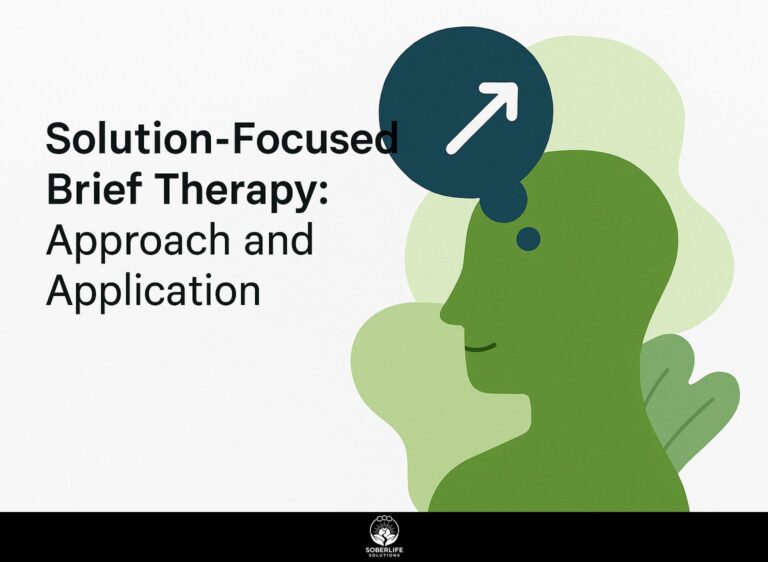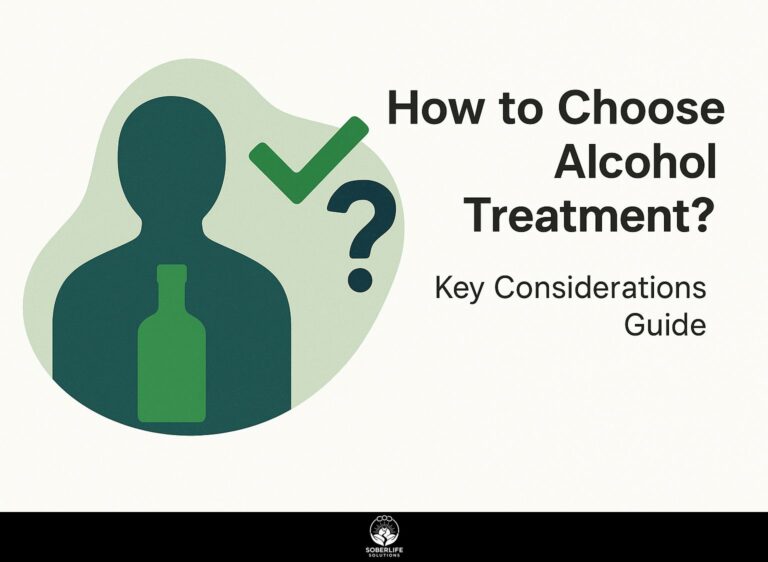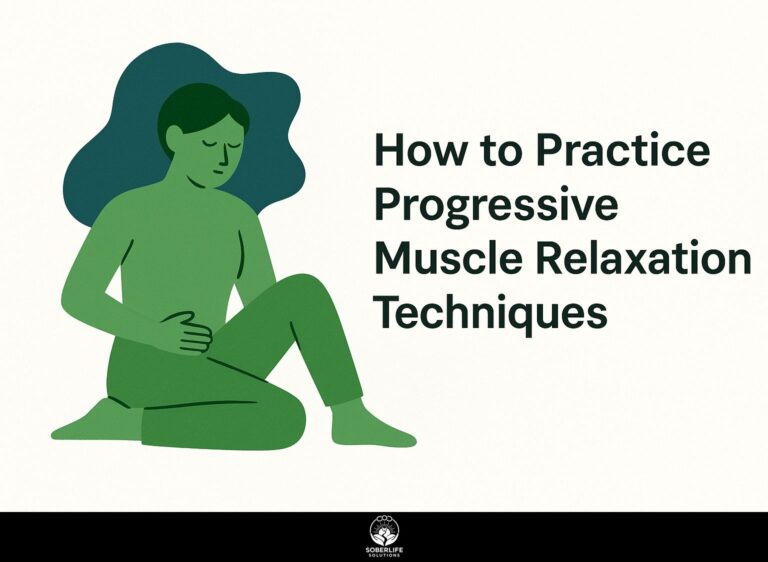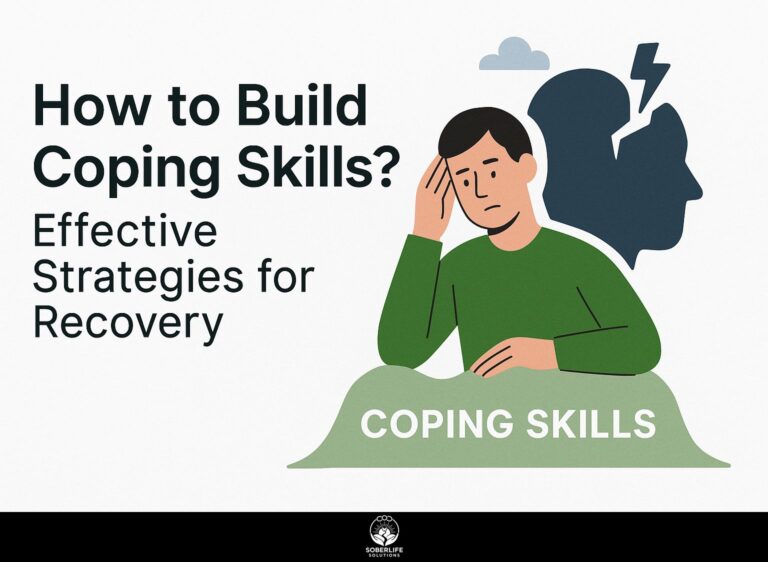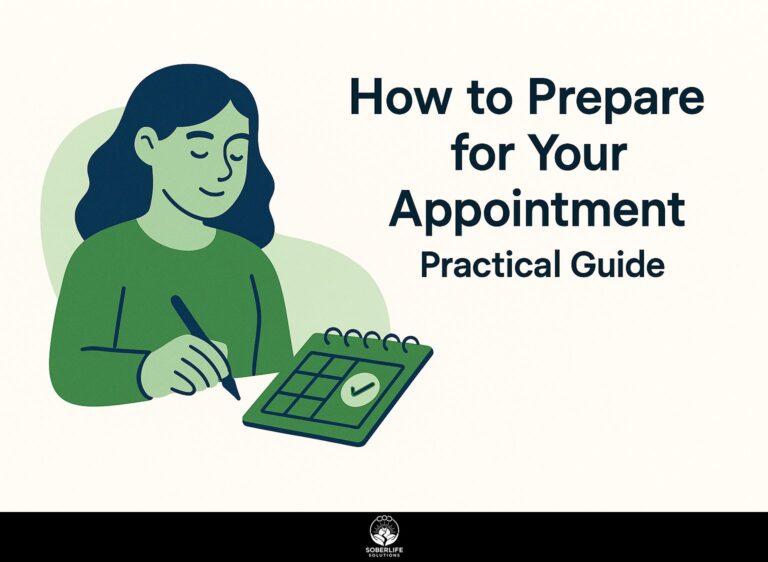SMART Recovery: Techniques and Benefits in Relapse Prevention
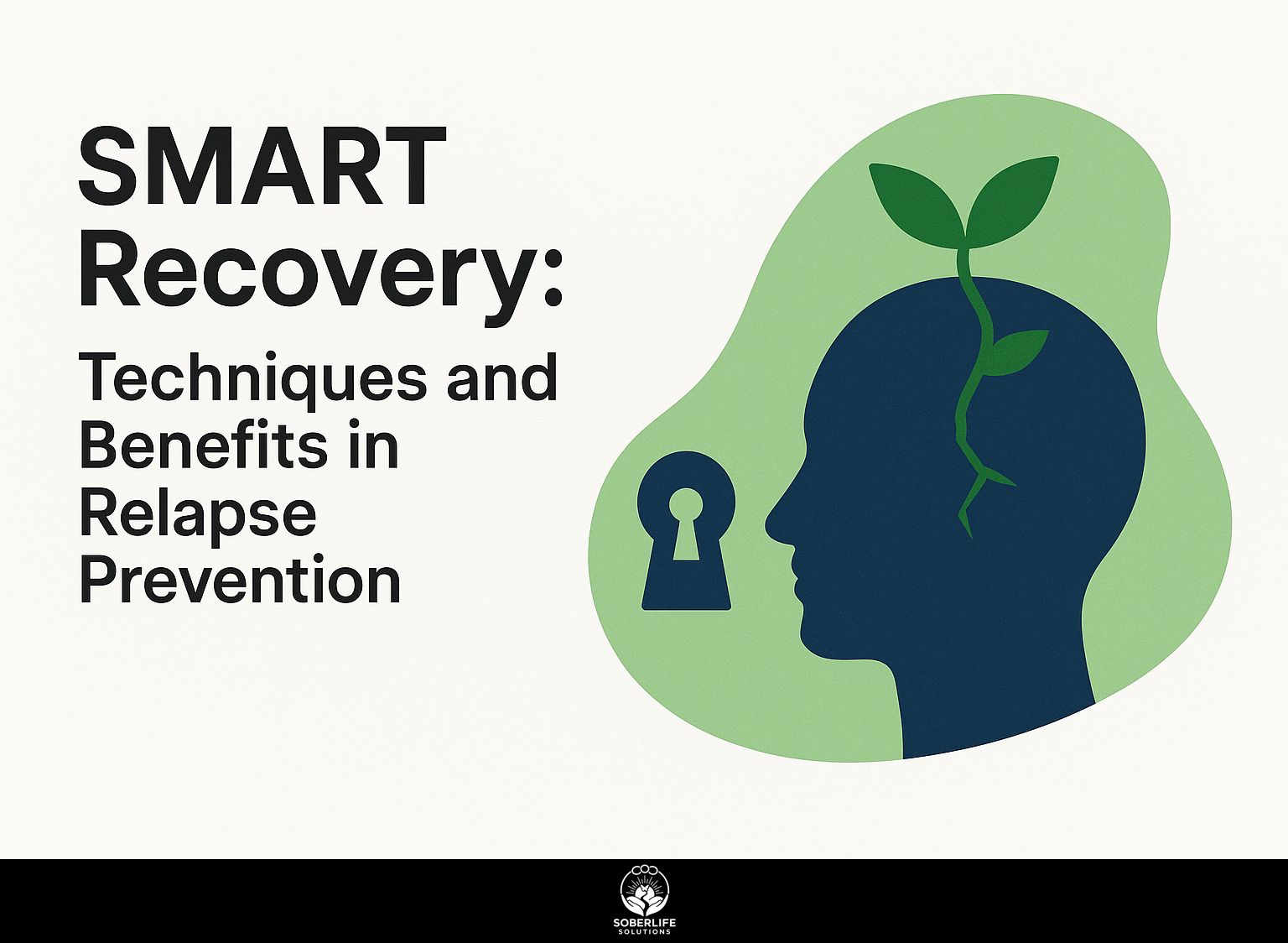
Avoiding setbacks is crucial for those in recovery, and SMART Recovery provides practical methods for this. By learning the five rules of recovery and identifying the stages of relapse, people can manage emotional relapse more effectively. SMART Recovery helps people stay sober by using cognitive therapy and self-care methods. This article explains how SMART Recovery methods can help stop relapse and teach important skills for long-term change.
Key Takeaways:
Overview of SMART Recovery
SMART Recovery means Self-Management and Recovery Training. It uses methods from cognitive-behavioral therapy to support people in overcoming their challenges.
The plan focuses on four key parts: creating and keeping motivation, handling urges, controlling thoughts, emotions, and actions, and living a well-rounded life.
Participants take part in self-guided learning and use methods like the ABCs of REBT (Rational Emotive Behavior Therapy) to question negative beliefs. For those interested in exploring more about cognitive-behavioral therapy techniques, the NHS offers helpful self-help CBT techniques on their Every Mind Matters platform.
For actionable steps, individuals can set specific, measurable goals related to their recovery, such as attending weekly meetings or practicing mindfulness exercises daily. If interested, [how to choose a support group](https://soberlifesolutions.com/choose-support-group-tips/) can provide crucial tips for finding the right community.
This approach, grounded in evidence, creates a space where people feel enabled and ready to handle their recovery successfully.
Comparison with Traditional Approaches
SMART Recovery emphasizes practical thinking and self-management, unlike typical 12-step programs that rely on a higher power.
SMART Recovery supports individuals in managing their recovery journey. This program is structured around four key points:
- Enhancing motivation
- Coping with urges
- Managing thoughts and behaviors
- Leading a balanced life
Unlike Alcoholics Anonymous (AA), which emphasizes group support and sharing personal stories, SMART Recovery encourages individuals to concentrate on self-improvement and create their own objectives. SMART’s approach to stopping relapse includes tools like the ‘SMART toolbox,’ which applies methods such as cognitive behavioral therapy (CBT). This approach encourages being proactive, which many favor instead of the group support focus in AA.
Core Principles of SMART Recovery
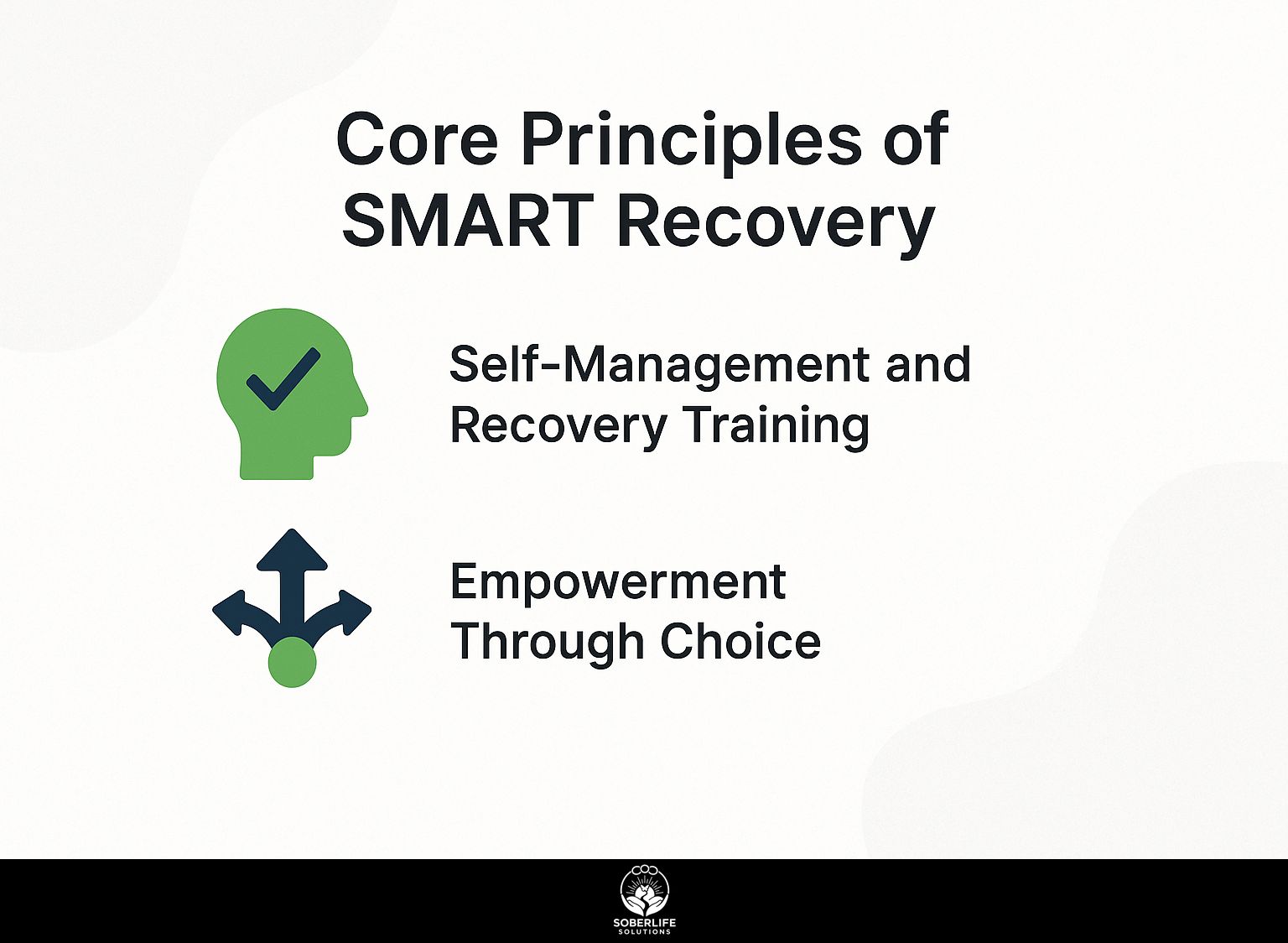
SMART Recovery emphasizes self-control and personal development, providing a way for individuals to manage their recovery. For an extensive analysis of this trend, our comprehensive study of the history and impact of peer support examines the origins and effectiveness of peer-based recovery programs.
Self-Management and Recovery Training
Self-Management and Recovery Training is an important part of SMART Recovery, teaching people how to deal with problems and make decisions about what to do.
Participants take part in hands-on activities, like the ABCs of REBT, where they question their beliefs about situations to promote better thinking.
The SMART Recovery Handbook offers simple steps to understand what triggers your reactions and helps you develop methods to manage these scenarios.
Journaling is also encouraged to reflect on emotions and progression. Participating in online meetings provides community support, while worksheets help in setting clear recovery goals.
By using these techniques regularly, people can become more resilient and improve their recovery efforts.
Empowerment Through Choice
SMART Recovery offers many methods and shows people how their decisions affect their recovery process.
SMART Recovery recommends using decision-making techniques such as comparing the pros and cons. For instance, a person might weigh the benefits of attending a support group against the discomfort of sharing personal experiences.
The ABC Model shows how thoughts influence emotions and behavior, helping people change negative thoughts into positive ones, which is a concept also supported by various mental health strategies, as mentioned in our exploration of how sobriety improves mental health.
By applying these methods, participants in SMART Recovery can make well-informed and confident choices that strongly support their recovery journey.
Techniques Used in SMART Recovery
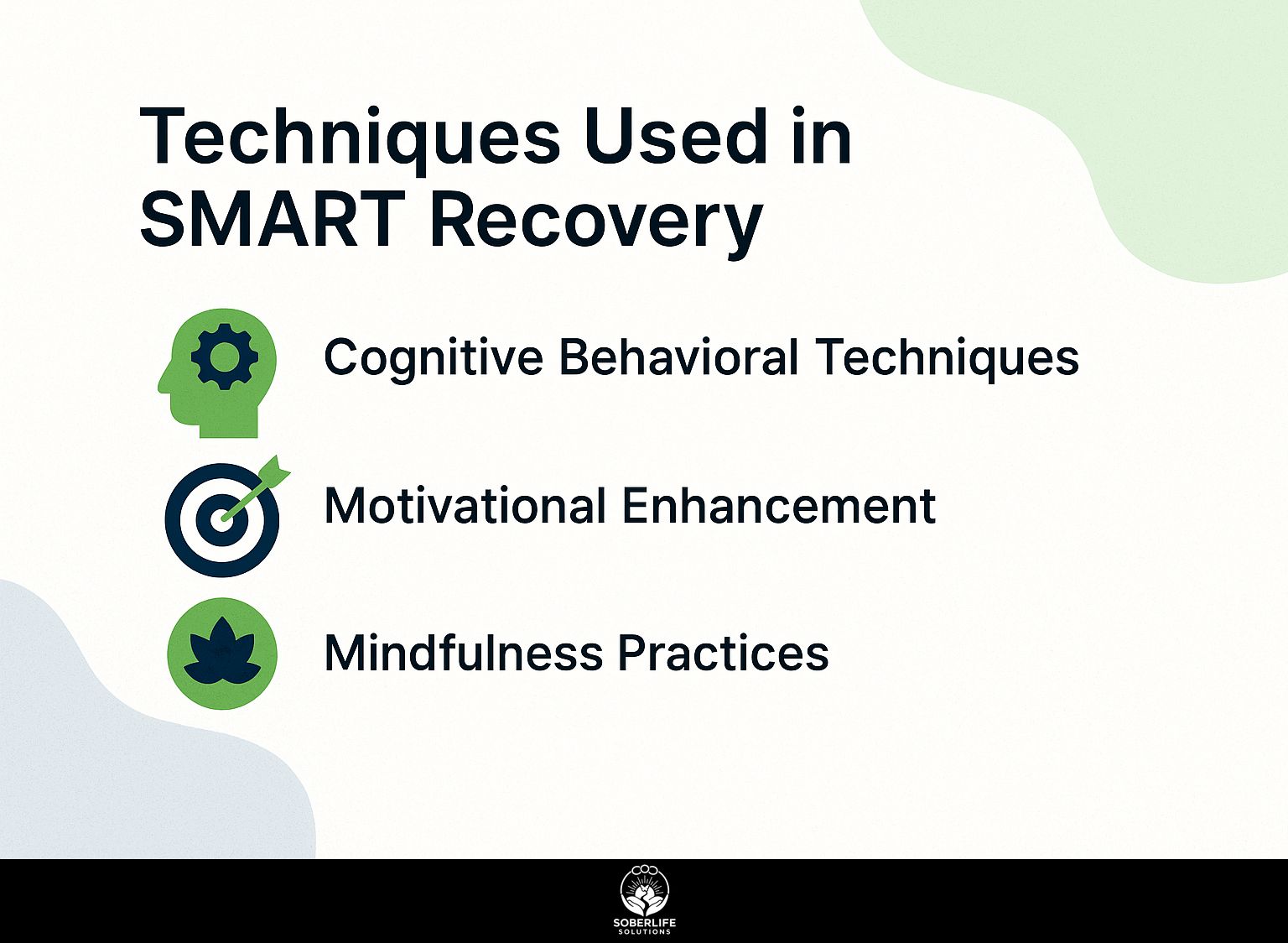
SMART Recovery uses techniques from cognitive behavioral therapy to help participants strengthen their motivation and knowledge.
Cognitive Behavioral Techniques
Cognitive behavioral techniques focus on altering negative thinking patterns that can lead to relapse, providing practical tools for change.
-
Two effective methods are cognitive restructuring and thought records.
Cognitive restructuring encourages individuals to identify irrational thoughts and replace them with more balanced alternatives. Instead of saying, “I’ll never succeed,” someone can say, “I can improve by learning from my errors.”
-
Thought records involve documenting distressing thoughts and analyzing the evidence for and against them.
Participants can use a simple template: write down the negative thought, the context, emotions felt, evidence supporting/rejecting the thought, and an alternative, more positive thought.
This activity helps you know yourself better and encourages more positive thinking habits.
Motivational Enhancement
SMART Recovery uses techniques to boost motivation, assisting people in following their recovery plans.
A useful method is motivational interviewing (MI), a way that helps people talk about their feelings on recovery. For example, instead of directing someone to change, a facilitator might ask open-ended questions like, ‘What would be different in your life if you were sober?’ This helps the individual articulate their motivations. According to an insightful overview by Verywell Mind, motivational interviewing is a collaborative approach that empowers individuals to make meaningful changes.
Creating clear goals that are specific, measurable, realistic, relevant, and timely can give you organization. For example, instead of saying ‘I want to drink less,’ a clear goal would be ‘I will have only one drink a week for the next month.’
Mindfulness Practices
Understanding yourself is important in SMART Recovery. It helps people handle stress and feelings to avoid falling back into old habits.
Practices such as meditation and breathing exercises help people become more aware of themselves and control their emotions better.
For instance, daily mindfulness meditation can begin with just five minutes, focusing on your breath and gently bringing your thoughts back when they wander. Incorporating a morning routine can set a positive tone, utilizing apps like Headspace or Calm for guided sessions. For context, an in-depth article by Mayo Clinic discusses how meditation is a simple, fast way to reduce stress.
Practice the 4-7-8 breathing technique: inhale for four seconds, hold for seven, and exhale for eight. This method is effective during moments of cravings, helping to ground and center your thoughts in those critical times.
**Benefits of SMART Recovery for Avoiding Relapse** SMART Recovery offers useful methods and tools to help people avoid falling back into addictive habits. It focuses on self-sufficiency and teaches daily skills that are essential for maintaining sobriety. – **Self-Management**: SMART Recovery encourages individuals to control their own lives and make personal decisions, aiding them in overcoming cravings. – **Increasing Motivation**: By identifying personal reasons for change, participants are motivated to remain dedicated to their recovery journey. – **Coping Techniques**: The program provides practical methods to handle urges and emotions, reducing the likelihood of relapse. – **Lifestyle Balance**: Promotes a well-rounded life, highlighting the importance of managing work, relationships, and personal hobbies to maintain sobriety. For more information, visit the [official SMART Recovery website](https://www.smartrecovery.org/).
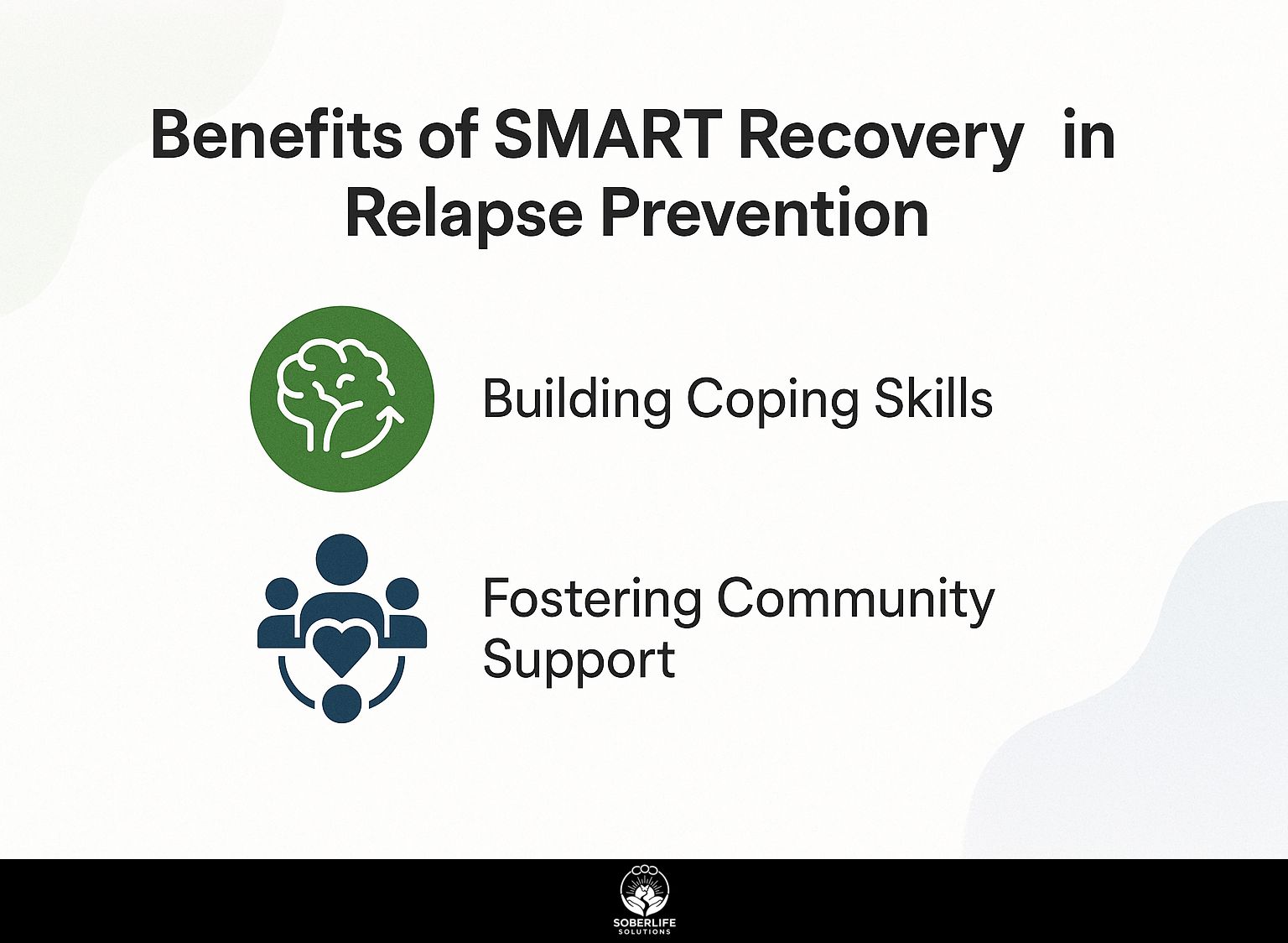
SMART Recovery provides practical ways to prevent relapses, such as planning for challenges and having a dependable support group. Related insight: History of Peer Support: Origins and Impact can deepen your understanding of the role support groups play in recovery.
Building Coping Skills
One benefit of SMART Recovery is that it provides useful techniques for dealing with difficult situations.
Participants learn methods such as managing their emotions and coping with stress to effectively face challenges.
For emotional self-care, engaging in regular mindfulness practices like deep breathing or journaling helps process feelings.
In terms of stress management, the ‘ABC’ model encourages individuals to identify Activating events, Beliefs about those events, and the emotional Consequences, guiding them toward reframing negative thoughts.
Activities such as practicing how to handle difficult situations or finding positive ways to divert attention can help participants deal with triggers in a more positive way.
Fostering Community Support
The help from the SMART Recovery group makes people feel included and encourages them to talk about their experiences to better their own recovery.
By attending meetings, participants can connect with others facing similar challenges, share coping strategies, and provide mutual encouragement.
Online forums also offer a flexible option where individuals can engage at their own pace. Many have reported that sharing their stories in these safe spaces reduces feelings of isolation.
One person said, ‘Listening to others talk about their struggles made me feel less isolated and more motivated to keep going.’
Being part of this community helps you stay responsible and strong, which are important for keeping up with recovery over time.
Implementation Strategies
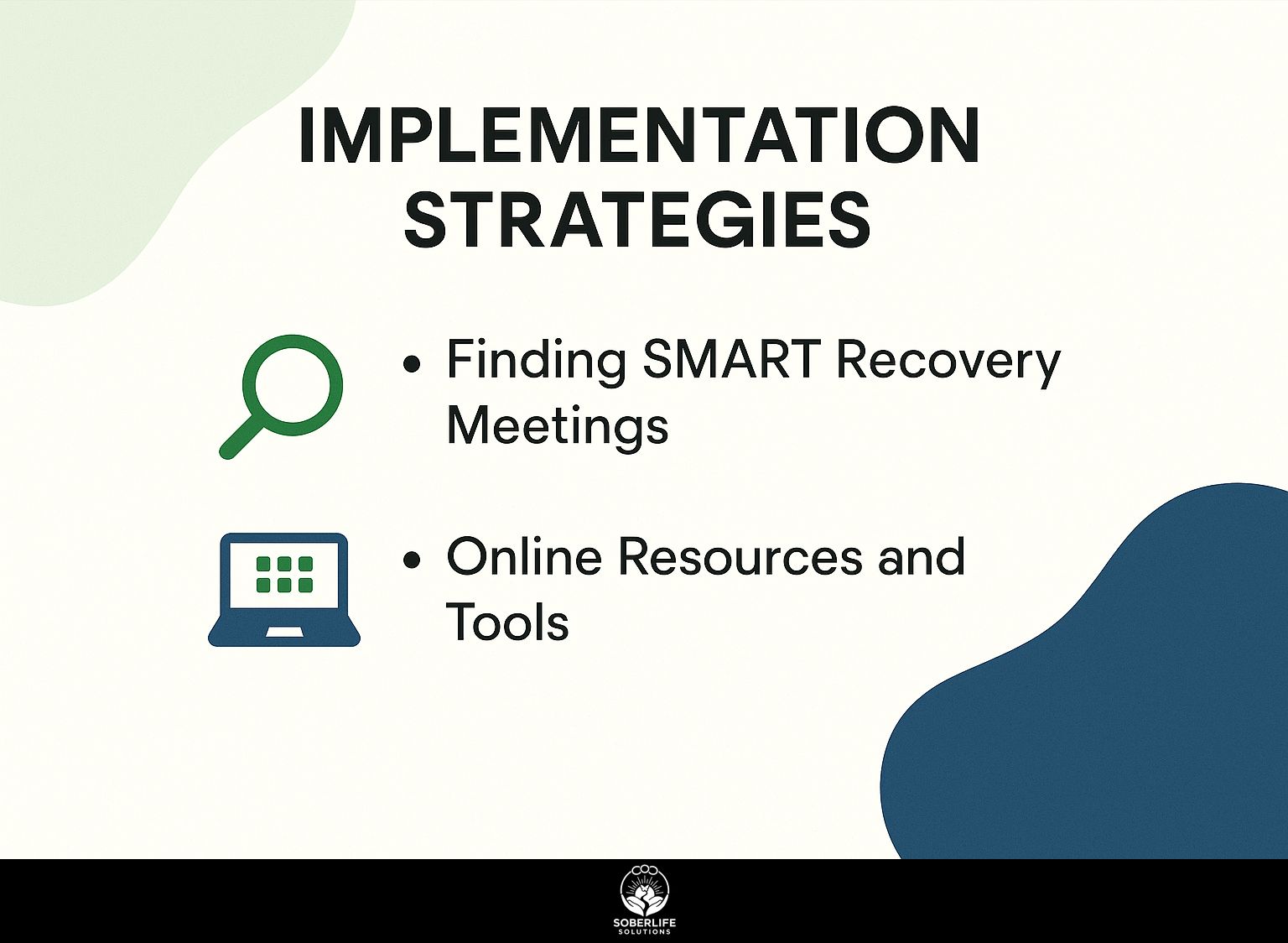
Having clear plans helps you get the best results from SMART Recovery regularly. To understand how these strategies fit into a broader framework, consider exploring our Five Rules of Recovery: Strategies and Importance, which provides a comprehensive guide to integrating strategic planning into your recovery journey.
Finding SMART Recovery Meetings
Going to local SMART Recovery meetings can help you feel better by providing in-person support and allowing you to talk about your experiences with others.
Go to the SMART Recovery website and use the ‘Find a Meeting’ tool to search for meetings close to you.
Check local community centers or libraries that often host support groups. For those preferring online options, the website also lists virtual meetings that allow participation regardless of your location.
You can connect with local recovery groups on social media to find casual gatherings or more resources. Joining these meetings helps build a supportive community and lets people share their experiences with others in similar situations.
Online Resources and Tools
Many websites and tools support people in their SMART Recovery process, offering guidance and chances to meet others.
The SMART Recovery website provides helpful tools like information materials, worksheets, and a calendar for meetings.
The SMART Recovery mobile app helps users track their progress and access useful resources while on the go.
Participating in online forums helps people feel part of a group where they can share their experiences and learn from others in recovery.
Visit the website to find local SMART Recovery meetings where you can meet people face-to-face and grow your support network.
Frequently Asked Questions
What is SMART Recovery?
SMART Recovery (Self-Management and Recovery Training) is a program built on scientific research that helps people stop addiction and addictive behaviors. It offers a 4-point program that focuses on building motivation, coping with urges, managing thoughts and behaviors, and living a balanced life.
What methods does SMART Recovery use?
SMART Recovery uses methods like cognitive-behavioral therapy, motivational interviewing, and Rational Emotive Behavior Therapy. These techniques help individuals understand their thoughts and behaviors, identify triggers and coping mechanisms, and develop a plan for relapse prevention.
How does SMART Recovery assist in avoiding relapse?
SMART Recovery helps people become self-reliant in their recovery by offering strategies and techniques to handle urges and cravings, deal with stress and challenging feelings, and build a steady way of living. These skills help prevent relapse and promote long-term recovery.
What are the advantages of SMART Recovery?
Some benefits of SMART Recovery include its focus on building personal strength, its use of proven methods, and its priority on ongoing and enduring recovery. SMART Recovery provides a support network with meetings and online chat groups.
Is SMART Recovery just for people with substance abuse issues?
No, SMART Recovery can assist individuals dealing with various addictive habits such as drug use, gambling, overeating, and shopping. Its techniques and principles are applicable to any type of addictive behavior.
Is joining SMART Recovery dependent on attending meetings?
No, going to meetings can provide support and help you stay on track, but SMART Recovery also has an online program you can finish on your own. The program includes worksheets, activities, and resources for individuals to work on at their own pace.

